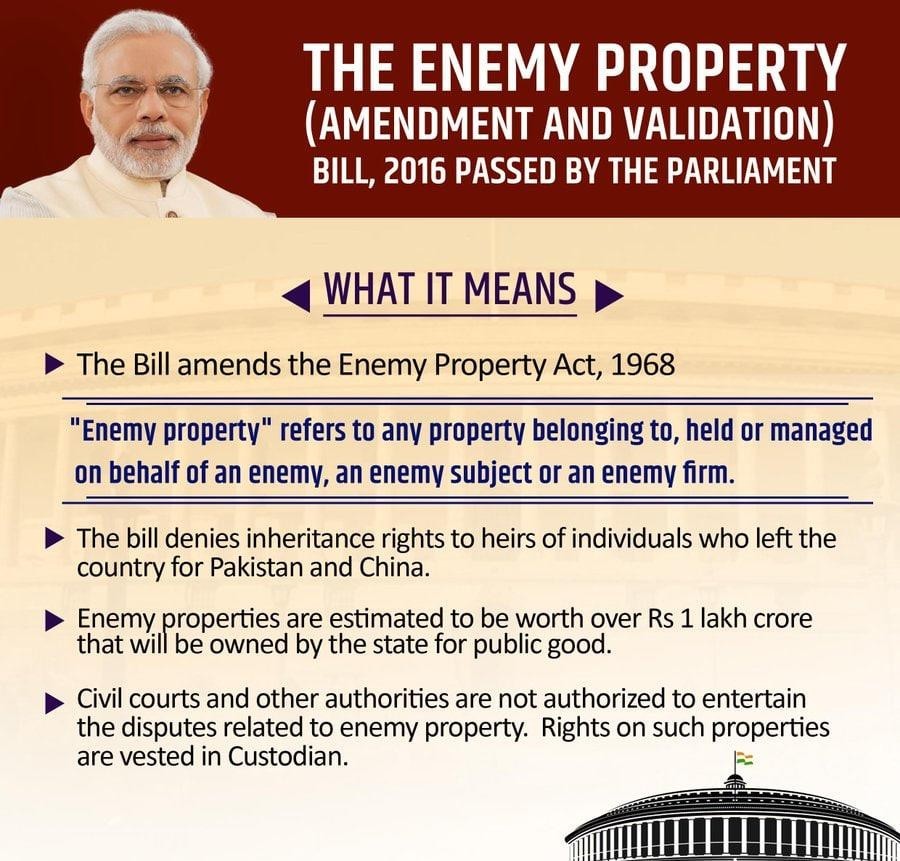Description

Copyright infringement not intended
Context: The Union government has started a Nationwide Assessment of Enemy Properties across 20 states and 3 Union Territories intending to identify and then monetize all such assets left by individuals who acquired Pakistani or Chinese citizenship following wars with these nations.
Enemy Property
- People moved from India to Pakistan as a result of the 1965 and 1971 Indo-Pakistan wars. The Government of India seized the assets and businesses of persons who adopted Pakistani nationality under the Defence of India Guidelines created under the Defence of India Act, 1962.
- The Custodian of Enemy Property for India received these "enemy properties" from the Union government.
- After the Sino-Indian War of 1962, the same was done concerning property left behind by people who migrated to China.
- A provision in the Tashkent Declaration of 1966 stated that India and Pakistan would negotiate about returning the property and assets that had been taken by either side as a result of the fighting. However, the Pakistani government sold off all of these assets in that nation in 1971.
.jpeg)
Regulation of Enemy properties in India
- The Enemy Property (Custody and Registration) Order and the Custodian of Enemy Property of India (CEPI) department were established by the Union government following the 1965 India-Pakistan war to manage the property left behind by those who migrated to Pakistan or other nations with which India has hostilities.
- Following the 1968 Enemy Property Act, the Custodian of Enemy Property for India was given continued ownership of enemy property.
- The Public Premises (Eviction of Unauthorized Occupants Act, 1971) and The Enemy Property Act, 1968, were both amended by The Enemy Property (Amendment and Validation) Bill, which was passed by Parliament in 2017. The modified Act expanded the definitions of "enemy subject" and "enemy firm" to include the following:
- The legal heir and successor of an enemy, whether a citizen of India or a citizen of a country which is not an enemy.
- The succeeding firm of an enemy firm, irrespective of the nationality of its members or partners.
Value of these properties and their location
- There are almost 12,611 enemy property spreads over 20 states and 3 UTs, of which 126 are the property of Chinese nationals and 12,485 are connected to Pakistani nationals.
- West Bengal, Delhi, and Uttar Pradesh are the three states with the most such properties.
- The government expects to raise Rs. 1 lakh crore by monetising the enemy properties.
- According to the MHA's annual report for 2021–22, the CEPI sold enemy property worth 3,407 crores, including 75,283,287 shares (for 2,708.9 crores) of 152 businesses in 2018–19, 2019–20, 2020–21, and 2021–22, as well as 699.08 crores in revenue receipts.

Recent steps
- To oversee the sale of enemy property left behind by those who migrated to Pakistan and China, the government established the Group of Ministers (GoM) in 2020.
- The GoM is currently led by Union Home Minister Amit Shah.
- The Ministry of Home Affairs had asked the Directorate General of Defence Estates (DGDE), which manages land and develops cantonment locations for the defence forces, to survey the enemy property.
- In 2022, the Union Defense Minister stated that the DGDE would start the first such survey outside of the Ministry of Defense.
- The Government of India mint in Mumbai has disposed of 60 lakh rupees worth of gold and silver that was declared as enemy property in January 2021.
- The national survey by the Directorate General of Defence Estates (DGDE) involves evaluating the present condition and value of more than 12,000 properties already identified by the Office of the Custodian of Enemy Property for India (CEPI).
- CEPI is an authority under the Union Ministry of Home Affairs (MHA).
- The majority of these assets are located in Uttar Pradesh, thus the nationwide assessment of enemy properties started from Uttar Pradesh.
|
PRACTICE QUESTION
Q. The office of Custodian of Enemy Property for India (CEPI) is an authority under the;
A. Ministry of External Affairs
B. Ministry of Defence
C. Ministry of Home Affairs
D. Prime Minister's Office
Answer: C
|

https://www.hindustantimes.com/india-news/centre-begins-survey-of-enemy-properties-across-the-country-101677956288478.html













